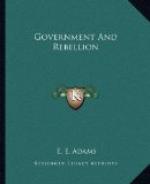This is now the strong tendency in the Rebel States: even along our free border, but below it, such is the system of representation, that a county containing only about 3,000 inhabitants, sends as many representatives to the legislature as another county of 30,000, and a single proprietor casts as many votes as a whole commune. So much liberty of citizens is already sacrificed to the chevalier, to the system of forced service.
But were a select number of experienced men, of true statesmen, embracing different pursuits and professions, educated in different parts of the world, and drawn together by grand national events,—statesmen born in the age when liberty had its first grand revival, and was guarded by soberness of thought, and tried by every variety and extent of sacrifice—by men who had no professional, exclusive interest to provide for, but who expected to fight and die for their convictions, who sought only to lay the foundation of a nationality for future generations, and for the world; who aimed at a healthful union of all popular interests, both among poor and rich, among masters and dependents; who provided for freedom of action under law; of worship and education, of commerce, agriculture, and the arts; for the easy and equitable support of government,—for its perpetuity indeed, infusing into it elements that appeal powerfully, both to the self-interest and the patriotism of the citizens,—I say, were such men, with such ends in view, by such sacrifice, to frame such a government, containing the most delicate balance of interests, with strong checks against the encroachment of any branch, either the legislative, executive or judicial, giving all trades and professions, and all men, an equal chance for excellence, influence, and honor; you would not hesitate to pronounce that a good government, even though you might find slight exception to some of its terms, though you might not interpret as others do, all its constitutional phrases.




